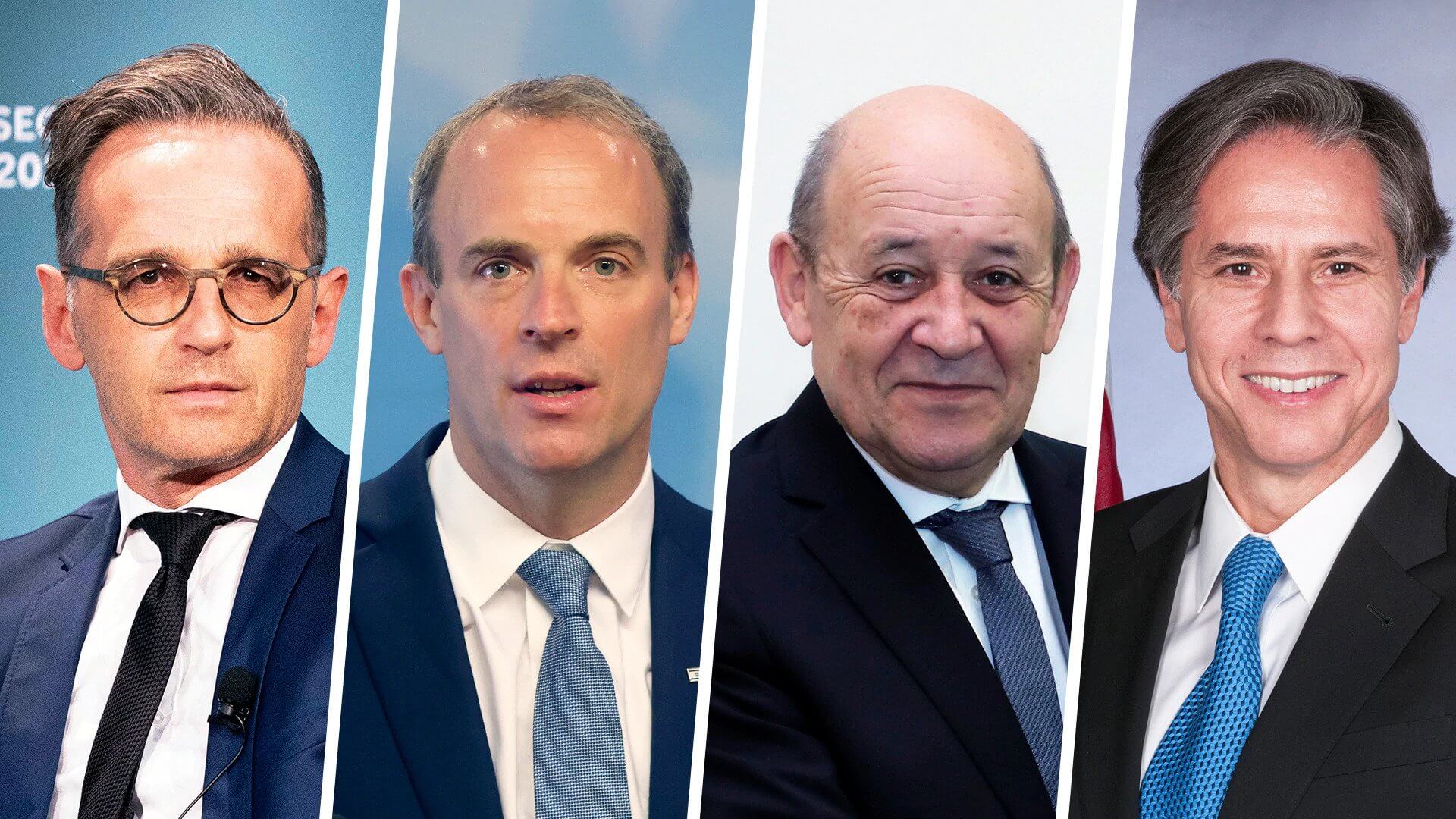French Minister for Europe and Foreign Affairs Jean-Yves Le Drian hosted German Foreign Minister Heiko Maas and British Foreign Secretary Dominic Raab in Paris on Thursday for a meeting about Iran and regional security issues in the Middle East. They were joined by United States (US) Secretary of State Antony Blinken via video conference.
In a joint statement released shortly after their discussion, the E3 and the US expressed their “shared fundamental interest in upholding the nuclear non-proliferation regime” and agreed to ensure that Iran can never develop a nuclear weapon. The states acknowledged the merits of the 2015 Joint Comprehensive Plan of Action (JCPOA) in helping achieve this goal through multilateral diplomacy and welcomed the US’ intention to return to the deal. The ministers also affirmed their interest to engage with important countries like China and Russia on this issue and recognised the role of the High Representative of the EU (a position currently held by Josep Borrell) as Coordinator of the Joint Commission. The Commission forms a part of the JCPOA and is tasked with reviewing and approving the parties’ obligations to the pact. It also reports to the UN Security Council at least every six months on the status of the deal’s implementation.
Iran and the US have been stuck in a diplomatic standoff regarding their return to the nuclear deal, with neither side willing to make the first move. Tehran has promised to fully implement the terms of the agreement if (and after) the US lifts crippling sanctions on the country. However, Washington has said that removing the restrictive measures will not be possible until it is sure that Iran is complying with the deal.
Under the terms of a bill adopted by the Iranian parliament in December, the US has until February 21 to ensure sanctions relief, after which Tehran plans to restrict short-notice IAEA nuclear inspections at its plants. Iran has also upped its uranium enrichment to 20%, and reports suggest it is also producing uranium metal. German Chancellor Angela Merkel spoke with Iranian President Hassan Rouhani on Wednesday and expressed concern over Tehran’s detour from the 2015 agreement. She also said that now was the time for “positive signals” that could build trust between the parties and “increase chances of a diplomatic solution.
The E3 and US officials echoed this sentiment in their declaration on Thursday and called on Tehran to avoid taking any additional steps relating to limiting IAEA access to the country, especially “at this time of renewed diplomatic opportunity”. The countries emphasized their determination to “strengthen the JCPOA and, together with regional parties and the wider international community, address broader security concerns related to Iran’s missile programs and regional activities.”
Apart from the nuclear deal, the ministers also expressed concern about continued human rights violations in Iran and called on the country to release all their arbitrarily detained nationals and reunite them with their families. They also discussed the urgent need to address the humanitarian crisis in Yemen and affirmed their determination to work towards de-escalating tensions both within Yemen and in the broader region as well.
On Iraq, the countries condemned the recent rocket attack in Erbil—that killed a civilian contractor with the American-led military coalition and wounded six others, including a US service member—and reiterated their support for the Iraqi government. The countries also agreed to continue cooperation to “target and eliminate” the ISIS threat in Iraq and Syria and noted the “growing importance of coordinating efforts to target the threat posed by ISIS branches and networks worldwide.”
The ministers also spoke about China and Myanmar and called on Burmese military leaders to “immediately end the state of emergency, restore power to the democratically elected government, refrain from violence, release all those unjustly detained, and respect human rights and the rule of law.” Finally, they agreed to strengthen alliances (like NATO) and vowed to cooperate on global challenges like climate change, and COVID-19 response efforts.
France Hosts E3-US Talks on Iran Nuclear Deal and Middle East Security
The countries called on Tehran to avoid taking any additional steps relating to limiting IAEA access to the country, especially “at this time of renewed diplomatic opportunity.”
February 19, 2021

(L-R) German Foreign Minister Heiko Maas, British Foreign Secretary Dominic Raab, French Minister for Europe and Foreign Affairs Jean-Yves Le Drian & US Secretary of State Antony Blinken. SOURCE: VOA
